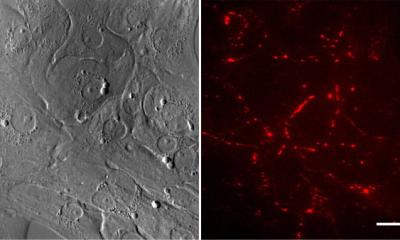Cardiac Biomarkers: Pipeline or pipedream
A drop of blood can unlock secrets of the heart. By analysing the biological elements present in a blood, a physician can better understand the extent of damage or disease for patients with heart failure and more confidently prescribe a course of treatment.

At this year's European Society of Cardiology meeting, Harvard University Professor James Januzzi, who leads the Cardiac Intensive Care Unit at the Massachusetts General Hospital in Boston, will update colleagues and challenge them with emerging evidence that supports biomarker-guided therapy. In this interview with European Hospital he also promises to deliver some ‘eye-popping news’ about the benefits of this approach to patient care.
An active researcher with more than 150 publications, the focus of Prof Januzzi’s work is with natriuretic peptides, protein-based hormones released by the heart when it is stressed. High levels of these peptides describe specific biological conditions of heart muscles. The studies, he said, ‘are extremely encouraging and imply that biomarker-guided care using this class of blood tests will be important and useful in a large percentage of patients with heart failure’
Cardiac biomarkers: What’s real, what is hype?
‘We have shown benefit from patient management with the natriuretic peptides. The question is whether there are other biomarkers we can obtain from the same blood sample that can tell us things the peptides can not. This brings us to the next class of markers, the pipeline markers. I titled one of my lectures 'Pipeline or pipe dream?' because we do not know whether these novel markers are necessarily going to add to our everyday management of patients. Several appear quite promising.
‘Highly sensitive troponin are markers of heart injury. While the mechanism may differ as to why the level elevates, it is a very high risk finding. It identifies a patient who, independent of the value of the peptide findings, is at higher risk for heart failure, hospitalisation, or death. The problem right now is we don’t know if managing patients according to their elevated troponin level will make any difference in outcome. Knowing that a patient is at high risk for heart failure does not mean you can do anything about it.
‘ST2 is a really fascinating marker. Biologically, it is a measure of heart fibrosis, or scarring. When the heart is injured, it goes through a process called remodelling. While remodelling is a good thing for our homes, when the heart remodels it is a bad thing. It can result in enlargement of the heart chamber size and a weakening of the heart muscle. ST2 is remarkably prognostic, predictive of progressive heart failure, hospitalisation and death, above and beyond any other measure of tropins or natriuretic peptides. Preliminary data suggests that specific therapies have favourable effects on heart remodelling and particularly benefit patients with an elevated ST2 value. This is very encouraging for biomarker guided management
‘Also in the pipeline there are metabolomic markers and genomic markers like microRNA, but these are far in the future and very far behind the protein markers now available or soon to be available.’
Many cardiologists are not convinced about the benefits of biomarkers...
‘Biomarker-guided care fits very well with other approaches, typically as a first step. We have proven two markers, BNP and NT-proBNP, are effective for the diagnosis of patients with heart failure, as well as establishing the prognosis of patients. It turns out the higher the level of these peptides, the higher the risk for hospitalisation and death from HF. The One Million Euro Question is whether these blood tests can be used as a guide to patient care.
‘There is positive data from other centres that is encouraging, notably the work of Richard Pacher at the Medical University of Vienna. It’s important to acknowledge that other studies, including one in Basel, Switzerland, have been negative, showing there is not a benefit in biomarker-guided management. The benefits of biomarker guidance have not been disproven and there are many questions as to why different trials have produced different results. Next year we’ll be examining the effectiveness of biomarker guidance in a larger international trial.’
How do biomarkers help guide treatment?
‘Typically a cardiologist spends 15 minutes with a patient measuring blood pressure and hoping that the doses prescribed for a medication actually will achieve a benefit. If instead we use a reproducible, non-invasive, biologically relevant measure that not only tells you how well the blood is flowing but also tells you, at the biological level, that there’s something wrong with the heart that can be addressed with an adjustment to medication, you can understand why biomarker-guided care can have a huge advantage.
‘How we define optimal medical treatment for patients with heart failure can vary. Yet there is a clearly defined path for care with patients with weakened heart muscles. The guidelines are unequivocal. We know which drugs to use and we know how to use them. For patients with heart failure and preserved heart function there is not yet a clearly defined management strategy. It stands to reason that a biomarker approach to heart failure care will not work for patients where the therapeutic strategy is not established. How can a compass guide you if you do not know where you are going?’
Your recent work suggests further benefits for biomarker guided care.
‘You want to know what the eye popping moment in my ESC presentation is? We have a very big finding that we are in the process of writing up for publication. Using echocardiography at baseline and then at 10 months of follow-up, we showed people with robust reductions in their NT-proBNP values had greater improvement in their ejection fraction and greater reduction in their ventricular volumes. In other words, these patients had a greater improvement in heart remodelling metrics than patients who did not have a big reduction in their NT-proBNP values.
‘What this says is that, besides leading to better management from a medication perspective and leading to more attentive medical care, these patients felt better -- they had better quality of life scores, and they had considerably fewer cardiovascular events. But, importantly, even on the biological level we can see the benefit. This lends biological reasons for utilising natriuretic peptide reduction as part of an overall care strategy for chronic heart failure.’
26.08.2011











